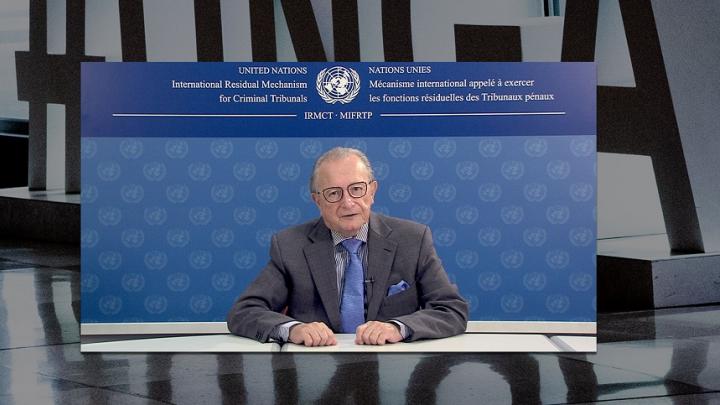President Agius Presents Eighth Annual Report to UN General Assembly

President Carmel Agius today presented the eighth Annual Report of the International Residual Mechanism for Criminal Tribunals (Mechanism) to the United Nations General Assembly.
The President commenced by congratulating His Excellency Mr. Volkan Bozkir from Turkey on his election as President of the historic seventy-fifth session of the General Assembly, and expressing his gratitude to the United Nations Secretary-General, Legal Counsel, and Office of Legal Affairs for their support of the Mechanism’s work.
President Agius then updated the General Assembly on judicial developments at the Mechanism’s two branches. Noting that the COVID-19 pandemic had interrupted the timelines previously envisaged for case completion, he was pleased to report on several important developments following the recent resumption of in-court proceedings. These included the appeal hearing in Prosecutor v. Mladić, the conclusion of evidentiary hearings in Prosecutor v. Stanišić & Simatović, and the commencement of trial this week in Prosecutor v. Turinabo et al.
In addition, President Agius highlighted the significance of Security Council resolution 2529 (2020), which not only reaffirmed the Mechanism’s mandate following the successful review of its work, but also urged Member States to further enhance their cooperation, particularly in achieving the arrest and surrender of all remaining fugitives indicted by the International Criminal Tribunal for Rwanda. In this regard, President Agius recalled the May 2020 arrest of Félicien Kabuga in France, which was made possible through collaborative efforts between the Mechanism’s Office of the Prosecutor and the law enforcement and judicial authorities of a number of Member States. Separately, he reiterated the importance of resolving the long-standing predicament of the nine acquitted and released persons residing in a safe house in Arusha, and urged Member States to assist in finding a permanent solution.
The President also praised the effective assistance and support provided by the Mechanism’s 15 enforcement States, noting in particular their efforts to ensure the health and safety of the Mechanism’s convicted persons during the current pandemic. Also in relation to enforcement issues, President Agius underscored the seriousness of his responsibilities in deciding on early release applications, referring to the revised Practice Direction on applications for pardon, commutation of sentence, or early release that he issued in May 2020 in order to simplify the process and ensure greater transparency.
Further, President Agius expressed optimism regarding Member States’ reaffirmation of their collective commitment to multilateralism. He noted that the ad hoc Tribunals and the Mechanism were established only because a strong and resolute United Nations had the courage to take action when needed, and that the Mechanism has a responsibility in “promoting and advancing the principles and purposes embedded in this Organisation’s founding Charter, which has endured the test of time for seven and a half decades”. He stated that “one of the lasting contributions of the Mechanism and its predecessor Tribunals is the establishment of a network of accountability, which reaches all corners of the world and has the potential to make justice an everyday reality within domestic legal systems”.
In closing, the President assured the General Assembly that the Mechanism’s Judges and staff remain determined to deliver on the solemn mandate entrusted to them by the United Nations. He emphasised that, in playing a crucial role in ensuring sustainable peace, international justice mechanisms will continue to require the support of the international community. In this respect, the Mechanism will rely on Member States’ sustained cooperation and assistance.
Prior to the meeting President Agius held a bilateral exchange with the President of the General Assembly, His Excellency Mr. Volkan Bozkir, during which they discussed the Mechanism’s current activities, as well as the ongoing relevance of multilateralism as a platform to address global challenges including those arising from the COVID-19 pandemic.